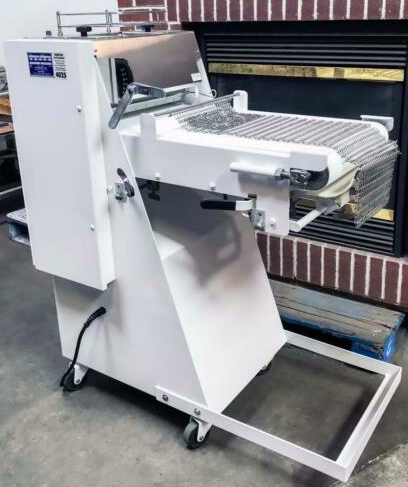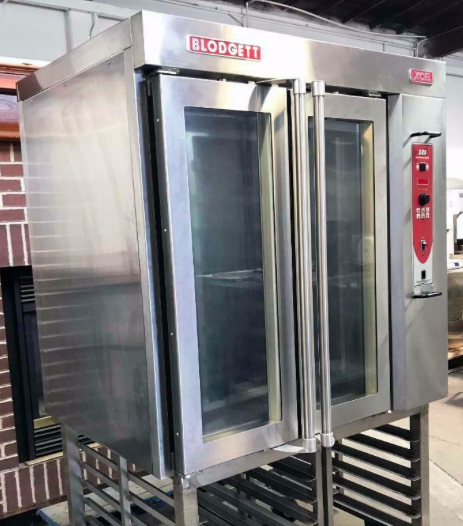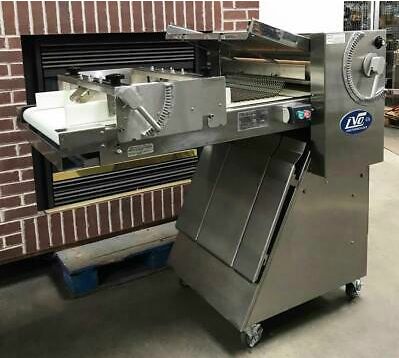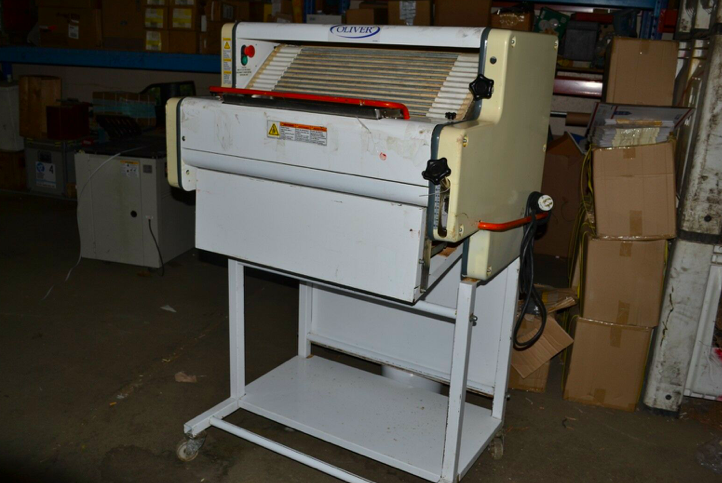Browse our active listings for commercial grade bakery equipment below. Each listing contains information about the condition, price, location, and photos of bakery equipment. Click here to view our full inventory of use restaurant equipment.
[display_listings l_type=”98″]
Introduction

Maybe you’re trying to outfit a commercial bakery, entirely from scratch. Maybe after hearing for years that your sourdough boules beat what’s being offered by every other bakery in town, you’re ready to jump into this business with both feet, and earn a living bringing your breads, rolls, and pastries to the world.
Or maybe you’re an experienced bakery owner, the kind of grizzled veteran of the business who was born with bread flour behind the ears and sports the massive, sinewy, burn-pocked forearms of someone who’s spent a lifetime in the business. Sooner or later, the needs of your business or going to change, or the triple-deck oven you’ve built your business on the back of is going to go belly-up, sending you scurrying to find a replacement.
No matter who you are, you’re probably looking for ways to save money in what can be a very expensive business. Between ovens, proofing boxes, and mixers, not to mention display cases, warmers, and shelving, operating a successful bakery means carrying tens (or even hundreds) or thousands of dollars in equipment on your back at any any one time, equipment that is expensive and prone to failure.
How do you find room in the budget to keep cranking out the high-quality baked goods your customers have grown to expect, while keeping your staff safe, happy, and working efficiently?
Fortunately, purchasing used bakery equipment can be a smart, responsible way to save money, and keep your extra cashflow ready for emergencies. Because of the strong, capable, well-built nature of commercial baking equipment, many of these pieces are designed to withstand heavy use, while performing admirably for decades. We’re here to help you learn the ins-and-outs of purchasing this kind of equipment secondhand.
Is Buying Used Baking Equipment a Wise Choice?

The decision about whether or not to buy used baking equipment (as opposed to new) is going to boil down to a few different factors. It depends on what kind of equipment you need, what your bakery can accommodate, and your available budget. Here are some additional considerations:
Pro: Commercial grade baking equipment is built to last. Unlike the ovens you may find at a big box store or in a residential application, commercial baking equipment is built tough, to withstand a ton of abuse.
Unlike the stove you have in your house, commercial equipment is designed to be turned on at the beginning of the day, and stay cranking until closing. This means you can expect higher-grade materials to be used in the construction process, better insulation and heat retention, higher BTU output, and more energy-efficient features designed for a commercial application. Because much of this equipment is so well-built, these pieces can outlast many of the small businesses in which they are installed.
Pro: Used bakery equipment is readily available. No one wants to hear it, but it’s an unfortunate fact of the foodservice business: Most places simply don’t survive, and if they do, they may not last for more than a few years. It doesn’t matter how good your pie crusts are, or how springy your baguettes; bakeries open and close every single day in this country.
It’s a sad reality for the baker that didn’t make it; often, someone outfitting a new bakery will have plenty of investment capital to blow on brand new, state-of-the-art ovens and other bakery equipment, which all must be sold (often to pay the bills) after the business folds. That’s where a savvy shopper (or new owner) can step in and find some amazing deals on used equipment.
Con: Used bakery equipment will probably need to be repaired sooner. Eventually, every major appliance fails, which means a costly visit from the commercial equipment repairman, who will gouge you with high labor costs, as well as the cost for replacement parts.
Unfortunately, when you buy a used piece of bakery equipment, you’re probably going to be scheduling that appointment sooner than you would on a new unit. But it gets worse: Most used equipment isn’t covered by a parts and/or labor warranty, which means that you’ll be paying out of pocket to get your used bakery equipment back up and running. You can minimize this risk by doing your homework before you decide to buy, but in general, you might want to keep your repairman on speed-dial.
Con: Used equipment may be a little rough around the edges. We can hear you saying it now. “It doesn’t matter what it looks like, as long as it gets the job done, right?” Well, you’re half right. In many installations, the overall appearance of your used bakery equipment shouldn’t be a factor, and in a perfect world, you’d be judged on the crumb of your croissant, rather than the blemished steel of your oven.
But with commercial bakeries trending more and more to so-called “open” designs, where the work on he kitchen is in full view of the public, appearances have to be something more of a consideration. While most customers will get a thrill out of seeing their bread made right before their eyes, this adds pressure to keep your kitchen, its appliances (and even its staff!) sparkling clean and new. While this is possible with used equipment, you’ll also have to contend with the years of abuse that the previous owner likely heaped on your bakery equipment.
Pro: Buying used means there’s probably room to negotiate. You know who gets to stroll into a new commercial bakery equipment showroom like they own the place, making demands for free delivery and haggling over every price they see?
The big dogs who are either opening their fifth location, or who have a $100,000 check burning a hole in their pockets. For the rest of us, there aren’t many opportunities to negotiate when you’re buying, say, a single new oven. Not so, in the used bakery equipment marketplace. Whether you’re buying from an individual, or a showroom that specializes in used commercial kitchen equipment, you can always take a shot at asking for a lower price.
Because restaurant equipment depreciates in value almost as quickly as a new car, prices tend to plummet as soon as the item leaves the showroom floor, which means there are plenty of great deals to be had just for asking.
General Guidelines for Buying Used Bakery Equipment

The “rules” for shopping for used bakery equipment vary somewhat, depending on the type of piece you’re interested in buying. But there are still a few general guidelines to keep in mind, to help you get the best price on a piece of bakery equipment that can serve you and your new business for years to come. Here are few things to keep in mind:
If possible, lean toward the big, name-brand manufacturers. You might spot a great deal on that Chinese dish unit with the tin sides and the wonky spray arm, but beware. Our thinking here is this: If the piece of equipment you are considering was considered “top of the line” when it was new, it’s probably going to hold up better in the long run, and across potentially multiple owners, businesses, and applications.
This is particularly true for large appliances, such as refrigerators, ranges, ovens, or prep units. Steer clear of second-or-third tier manufacturers or brands you’ve never heard of, who often use cheaper materials, poorer insulation, and who may even factor hefty repair bills into their shaky business models.
If you can choose between propane (or natural gas) or electric, go gas. Of course, this isn’t a possibility in every location, and will depend on whether you have established gas lines in place, as well as the requirements of your local fire code.
But if you have the choice, we always urge people to go with gas. Propane and natural gas powered appliances tend to be a little simpler than electric, and simpler mechanics mean that there are fewer points of potential failure (and costly repairs). Gas can also be more fuel efficient, and less expensive to operate in the long run.
Ask yourself if you really need all of the latest bells and whistles. As every serious baker knows, sometimes, the old ways are the best. There’s a reason why some of the best bakeries in the world are built around massive, single-deck pizza that are older than even time itself, and which still reliably crank out loaf after consistent loaf.
Why? Because they’re dead simple. A million pounds of cast iron, some fire, and a simple ignition system are all that’s required by some of these older appliances, which ensures they have the potential to keep running for generations.
While newer equipment may have some truly drool worthy features, such as electronic displays, computer-controlled temperature regulation, and shiny, energy efficient construction and insulation, remember that every single one of these “features” has the risk of breaking down and crippling the entire unit at any point. In general, we recommend searching for used bakery equipment that’s as light on these kinds of “extra” features as possible.

Don’t be distracted by the cosmetic condition of the equipment. If the outside of the proofing box you’re considering is marred by surface rust and dings, or the door of your oven looks like it was kicked closed by a violent size 14 mud-covered clog one too many times, don’t focus on these sorts of cosmetic considerations too much.
While anyone who spends thousands of dollars on a used appliance would like to be able to pop it right into the kitchen and get to work, some of these units may need a little elbow grease (not to mention gallons of commercial grade, cancer-causing solvents and degreasers) to be brought back to life.
Most commercial used bakery equipment gets used pretty hard, and cleaning and maintenance schedules may not have been followed to the letter. But remember that almost anything can be brought back to life, with the right combination of chemicals and hard work. Of course, if the piece of equipment you’re considering is particularly filthy, consider using that as a negotiating point to score a lower price.
